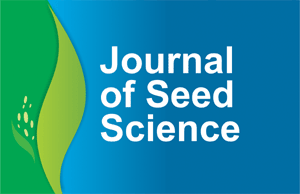Abstract:
This study aimed to evaluate the effect of genetic composition and arrangement between female and male parents on tolerance to delayed drying of maize seeds, evaluating the physiological quality and enzyme expression. Ears were harvested close to the stage of physiological maturity (around 35% moisture) and the genotypes were identified as line 1 (L1), line 2 (L2), the hybrid (HB - ♀L1 and ♂L2), and the reciprocal hybrid (HR - ♀L2 and ♂L1). For assessment of physiological quality, CDR (4x6x2) was used, consisting of four genotypes, six times of delay before artificial drying (10, 18, 24, 28, 32, and 40 hours), and two drying delay temperatures (42 and 48 °C). DIC (4x3) was used for enzymatic expression, consisting of four genotypes and three delay times before artificial drying (10, 24 and 40 hours) at 48 °C. Analysis of variance F (p < 0.05), Tukey’s test (p < 0.05), and analysis of polynomial regressions were performed on the data. Lineage arrangement affects seed tolerance to drying delay. Therefore, susceptible lines should not be used as female parents. The seeds of the line most susceptible (L2) to delay in drying exhibit less expression of α-amylase (α-AM).
Index terms:
α-amylase; deterioration; germination; LEA proteins; vigor

 Thumbnail
Thumbnail
 Thumbnail
Thumbnail
 Thumbnail
Thumbnail
 Thumbnail
Thumbnail
 Thumbnail
Thumbnail




